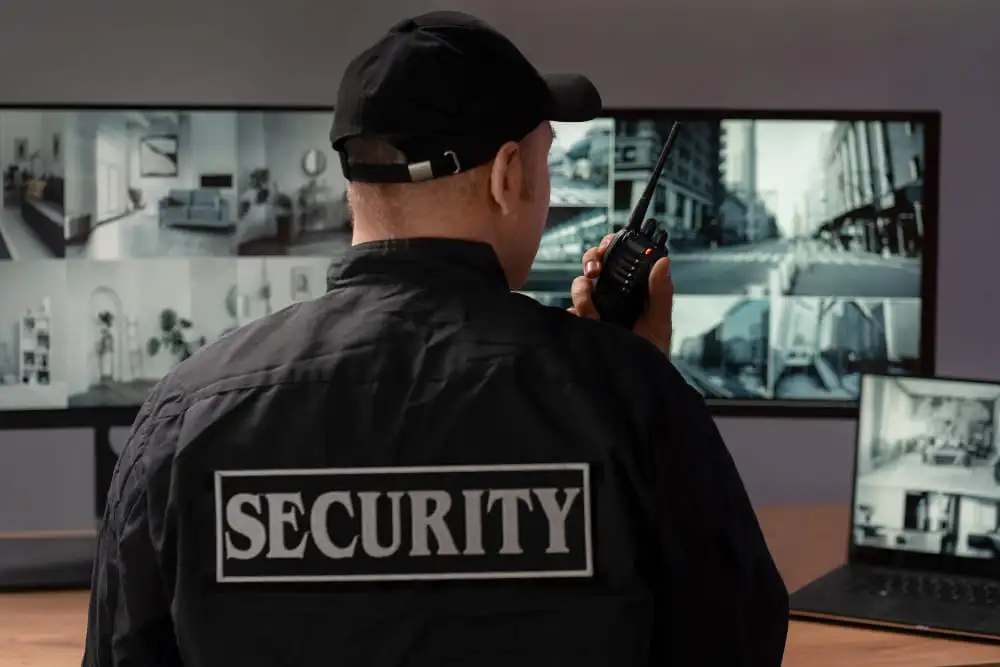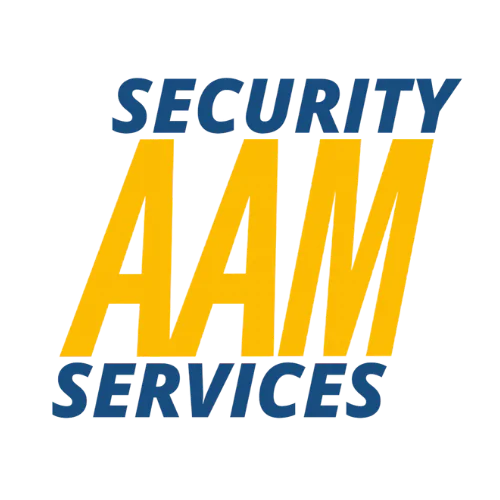What Are the Duties of a Security Guard? (15 Key Responsibilities)

Security guards protect people, organizations, and assets by maintaining a necessary presence on their property. Duties can include monitoring commercial buildings using alarm systems and time clocks, as well as undertaking physical patrols of a specific or assigned area.
They control access so that only those with permission can enter secured areas, thereby decreasing the chances of theft, vandalism, or anything else you don’t want happening. They are trained to act quickly in emergencies — a fire, medical emergency, security breach — and to keep a level head and a semblance of order.
More than just security, guards also serve as customer ambassadors who direct visitors and answer questions, helping create a secure and welcoming environment. They are responsible for maintaining order at events, defusing confrontations using mediation, and maintaining official records of all incidents for the law and internal purposes. They also monitor alarm systems and, when trouble arises, can play a critical role as a link in the chain between public and private safety.
The Core Duties and Responsibilities of a Security Guard
Patrol and Surveillance
Routine patrols combined with surveillance, for example, help identify threats from the outset. It is this proactive action that keeps pressure constant and prevents crime.
Conducting regular foot and mobile patrols of assigned areas.
Both foot and car patrols cover the entire property. They can be used to catch security breaches, safety hazards, or suspicious behavior.
Monitoring surveillance equipment, such as CCTV cameras and alarms.
Both foot and car patrols cover the entire property. They can be used to catch security breaches, safety hazards, or suspicious behavior.
Conducting safety inspections and identifying potential hazards (e.g., fire risks, maintenance issues).
Routine inspections allow you to identify fire hazards, leaks, or malfunctioning systems early. Timely reporting will allow for prompt maintenance and limit liability.
Observing and reporting any suspicious behavior or unauthorized activity.
Guards monitor for suspicious behavior that could signal a threat. Everything is documented and reported to supervisors or authorities.
Access Control and Visitor Management
This means controlling who comes and goes in the building for the sake of security and hearing confidentiality. Guards keep unauthorized people out of facilities by verifying registration.
Verifying the identity of personnel, visitors, and contractors.
IDs and passes are verified as legitimate before allowing access. This prevents those unauthorised individuals from entering the areas which are secure areas.
Issuing visitor passes and maintaining detailed visitor logs.
Guards manage and approve passes as well as log visit information for control and audit purposes. The correct logs support audits and investigations when they are mandatory.
Controlling access to restricted or sensitive areas.
Sensitivities areas are protected with strict rules of entry and oversight. MaxSec doors only allow authorised parties to enter, hence minimising risk and breaches.
Managing vehicle entry and parking.
Cars are checked and then ushered to special parking zones. It is to control the traffic, to ensure safety, and to restrict unauthorized access to vehicles.
Emergency Response and Incident Handling
Training for security guards. Who’s that over there in the corner beside a life saver and the AED? Their response provides safety, quorum, and proper coordination with the emergency services.
Responding to alarms, disturbances, and security incidents.
Guards respond promptly to alarms or disturbances. They serve as a stabilizing force and deterrent to those who would incite violence, and help ensure that violence does not escalate when it does occur.
Coordinating with emergency services (police, fire, EMS).
They also notify and help agencies respond to emergencies. Good comms translates to a quick and effective response from the outside.
Providing first aid or CPR in medical emergencies until professional help arrives.
Trained guards secure victims with basic first aid or CPR. This on-the-spot car can be life-saving in the time it takes for EMS to arrive.
Implementing evacuation procedures during fire or other emergencies.
Guards direct people to the nearest exit and control an evacuation. They stave off panic, keeping everyone safe in the most important moments.
Incident Reporting and Documentation
Correct reporting helps with accountability, investigations, and future responses. What Do I Write in a Security Incident Report? Security incident reports need to be documented in a clear, factual, and unbiased manner.
Writing detailed and accurate incident reports.
Reports will document the date, facts, and times of the event and any observations. Well-crafted reports help support litigation and internal investigations.
Maintaining security logs and daily activity reports.
Logs are maintained for every day on activities, visitors, and deficiencies. These records are important for identifying trends and increasing transparency.
Documenting evidence for investigations.
Guns are preserved alongside photos, eyewitness testimony, and physical evidence. A detailed record of findings enhances the credibility of the investigation.
Rule Enforcement and Conflict Resolution
Guards enforce rules and mediate disputes to ensure overall security and safety. They work with discretion, communication, and authority to enforce breaches.
Enforcing company rules, policies, and regulations.
Guards make sure that everybody complies with the rules of the organization and health and safety regulations. Disobedience is handled calmly and by due process.
De-escalating conflicts and managing difficult individuals.
They also employ verbal techniques to soothe the situation and prevent flare-ups. Calmness and sensitivity are also important when the situation is tense.
Managing crowds and ensuring public order.
Ways in which crows are managed to keep them moving, not to be uprooted, and cause them no harm. Guards are constantly on the lookout for potential unrest and are proactive.
Detaining individuals suspected of criminal activity until law enforcement arrives
Guards detain suspects by the least force and means of legality when circumstances require. They secure the scene and prepare for police to assume custody of the case.
Property and Asset Protection
Security guards protect property and assets against theft, fire, and other hazards.
Protecting physical assets and company property from theft or damage.
They watch and guard to prevent unauthorized entry and to safeguard property.
Securing doors, windows, and gates at the end of a shift.
All of the doors’ locking mechanisms let with a visual check that the site is secure.
Escorting individuals or valuables to ensure safe transport.
SecuritySecure transfer of people or assets is accompanied by a protective escort.
Customer Service and Public Assistance
Guards provide assistance, direction, and a calming presence to the public.
Providing directions and answering visitor questions.
They assist visitors in finding their way around and answer general questions.
Assisting employees, residents, and visitors with general inquiries.
Guards will help with access, time, or safety questions.
Acting as a visible and reassuring presence.
It’s protection against misbehavior and a message to people that they are safe.
What Should a Security Guard NOT Do?
The security guard has no right to use excessive force, break the law or exceed their authority under the law. They are not to allow themselves to neglect, to discriminate or to mix in any way where the safety and professionalism can be jeopardized.
Essential Skills and Qualifications to Become a Security Guard
Guards must be in good physical shape, alert, and able to communicate effectively.
Educational and Licensing Requirements
Schooling, either a high-school diploma or a college degree, is required and, in almost all cases, a state license.
Minimum education (e.g., high school diploma).
A grade-school education is necessary so guards can follow procedures and file reports.
State-specific licensing and certifications.
Laws on licensing are varied, sometimes including background checks and security training.
Necessary training (e.g., first aid, de-escalation).
Emergency duty and conflict management training would be vital.
Important Qualities and Soft Skills
Their successful guards exhibit alertness, communication, and emotional control.
Strong observation and attention to detail.
They pick up little differences or irregularities that others might not pick up on.
Excellent communication and interpersonal skills.
Clear and polite communication serves to mitigate situations and to professionally communicate.
Calmness under pressure and problem-solving abilities.
They stay calm in a crisis and make good decisions under pressure.
Physical fitness and situational awareness.
It’s also conducive to how fit and aware they are, so that they can react quickly to threats that are moving targets.
A Sample Security Guard Job Description
In charge of safeguarding property, overseeing activity, enforcing regulations, and taking action in the event of an emergency.
Looking for a Security Guard? Find Your Ideal Candidate
Enlist experts who are properly trained and remain alert by using the best communication for mistake-free protection.
Send us a message
Start Your Security Journey and Get a Free Consultation.
Security Guard Services
Start A New Project?
Don’t wait to feel secure. Get a free quote today and start your AAM Secure project!
Address
102 West 132nd Street
New York, N.Y. 10027
————————
100 Park Avenue, 16th Floor
New York, N.Y. 10017
